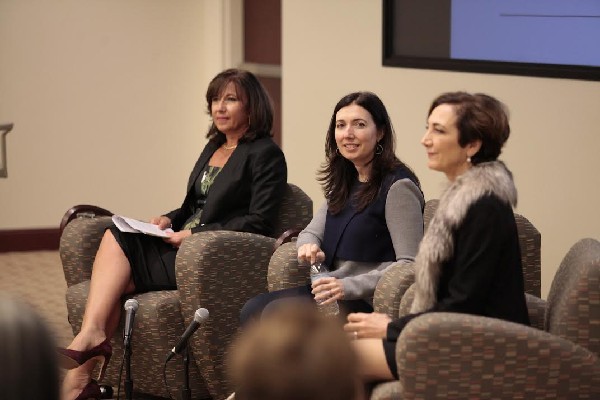Women and the Art of Negotiation Discussed at Montclair State

Better negotiation skills mean a better life. You don’t get what you deserve, you get what you negotiate. With that in mind, the Feliciano Center for Entrepreneurship, at Montclair State University, hosted some female heavy-hitters at an event on March 28 called, “Playing Hardball in Heels: Learn the Art of Negotiation.”
And yes, there were some men in the audience for the event, which was cosponsored by the Women’s Center for Entrepreneurship Corporation (Chatham). The WCEC offers 140 free classes each year to support entrepreneurs.
On the dais were attorney Rosario A. Suriano, a litigation partner at Meyner and Landis (Newark), and angel investor Fran Hauser, formerly a Time Inc. media executive and now a partner at Rothenberg Ventures (New York, NY). Among the companies Hauser has invested in are ZADY, Levo League, Hullabalu, and Rent the Runway, all in New York, and HelloGiggles, in Los Angeles. Rounding out the panel was Mimi Feliciano, founder and CEO of Montville-based FEM Real Estate and benefactor of the Feliciano School of Business.
Here are some highlights of the discussion:
On the importance of knowing your counterpart:
Suriano told the group, “The key I need to know is: Where does my client want to be? Does he or she want to close the deal? Do they want to send a message? Is there a strategic position they want to be in?
“Scheduling an in-person meeting and looking at the person across from you is key.” When you walk into that room, you have to command that room. Where you sit, how you sit, how you look at the person across the table or room are also key.
Her secret weapon: You have to understand whom you’re negotiating with. Are you dealing with a screamer? If so, you have to take a very aggressive position. But sometimes taking a softer position will get you what you want. It’s really about getting to know whom you’re sitting down with.
On looking for the win/win:
“It’s really important to understand the value you want to get out of a negotiation,” and what’s important to the parties negotiating,” said Hauser. “You really do want to get to a win/win. It’s important that the other person not leave the negotiation feeling screwed. You have to be a partner with this person in the long term.”
Are you treating this person fairly and ethically? Do you really understand what’s important to them? That really lays an important foundation. These become your partners for life in business.
“It’s a long road. If you think about it as a long road, rather than a sprint, these are people who may be in your business life for years, even if the partnership falls apart and the outcome is not successful.”
On knowing what you will settle for:
“You must have your BATNA — your best alternative to no agreement,” Feliciano said. “You have to be confident and prepared, but the thing you have to know for sure is what happens if this doesn’t work out. You have to know at what point that fallback position is better than what you leave at the table. The stronger your BATNA is, the more you’re not going to get pushed around — you know that you’ve got something ready in your back pocket. There’s something about knowing that which gives the confidence or aura that you’re not going to give up what is important to you.”
She also advised the audience to “ask a lot of questions. Do a lot of listening and asking.” If you understand what the other side wants, you’ll have more options as to what can be done collaboratively. “Just because you win doesn’t mean they have to lose,” she noted. “The idea of problem solving and the idea of collaboration promotes good will. You can’t do that if you’re doing all the talking.”
On the topic of listening, Hauser recommended asking others at the table what is important to them, not just the person you are directly negotiating with. And if, as has happened to her, you find yourself with 16 people around a table, create a false sense of urgency by giving a deadline. Ask who needs to be in the room to make that happen. “Otherwise, it can take six months to get anything done.”
On not underestimating the importance of strategy:
Strategy is key, said Suriano. “I consider what I do like a chess match. I handle complex commercial matters. Deciding strategically when to do something is critical. Being prepared is also so important for confidence. It’s important to be nervous, because if you’re not, you’re too comfortable. But be prepared and show your confident side. Every day is a moving target. You have to anticipate what the other person is going to do.”
As for getting funding, Hauser said that, when deciding what companies to invest in, she looks for people who have accomplished something by really doing the work. “Entrepreneurs in the technology space have a tendency to get a lot of attention. There are all these lists … 30 under 30 … When I really peel it away, it’s all smoke and mirrors. It drives me crazy, all these lists. You really have to do the work.” Prove there is a market opportunity and a pain point you’re solving, she advised.

